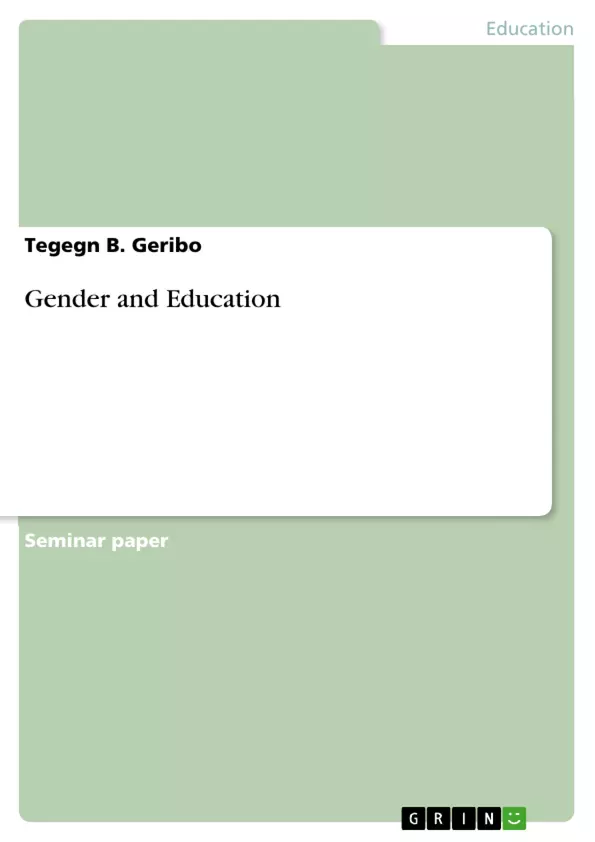Abstract
Education is universally recognized as playing role in sustainable social and economic development. Regardless of the ideology underlying approaches to development, education improves the quality of life; it improves health, expands access to paid employment, increases productivity in market and non-market work, and facilitates social and political participation. Because of these facts, the education of girls and women is therefore an important investment, despite the precarious economic contexts within which many countries have to provide for education. Gender refers to historical and sociological relationships between women and men. If development is seen as an attempt to raise the quality of life all citizen, gender in development works toward ensuring that the special needs of women with respect to those of men, are met in this process. However, significant gender inequalities exist in education sector. These inequalities are found not only in indicators which can be rapidly obtained from statistical sources such as literacy, enrolment, achievement and levels of schooling attained, but also in several other aspects of education which are of concern in the pursuit of gender equality and equity such as management personnel in decision-making roles, curriculum content and reform, and the pupil-teacher interaction.
Table of Contents
- Introduction
- Examination of feminist theories on gender inequality
- Gender identity and socialization
- Impact of culture and Gender in education sector
- Gender discrimination and biases in classroom teaching and curriculum
- The interaction of gender, race, class and ethnicity
- Eco-feminism and education
- Gender equality as organizational change in education sector
- Evaluation of gender Equality policies in relation to Education
- Education and Women in developing countries
- The positive impact of women and leadership programs in Education Sector
Objectives and Key Themes
This text aims to examine the pervasive issue of gender inequality within the education sector. It explores the historical and societal factors contributing to this inequality, analyzes its manifestations in various aspects of education, and considers potential solutions for promoting gender equality.
- Gender discrimination and bias in education
- The impact of culture and societal norms on gender roles in education
- Feminist theories and their application to understanding gender inequality in education
- Gender equality policies and their effectiveness
- The role of education in empowering women
Chapter Summaries
Introduction: This chapter introduces the persistent problem of gender inequality in education, highlighting how it manifests in unequal treatment between boys and girls, particularly in developing countries where educating boys is often prioritized over educating girls. The chapter sets the stage for a deeper exploration of gender discrimination and bias within educational systems, acknowledging the growing awareness and progress in developed nations while emphasizing the ongoing disparities globally. It establishes the central theme of the text: the need to address gender inequality to ensure equitable opportunities for all.
Examination of feminist theories on gender inequality: This section delves into various feminist theories to explain the systemic nature of gender inequality. It explores how societal structures and norms perpetuate unequal power dynamics between men and women, influencing opportunities and access within education. The chapter analyzes different theoretical perspectives on gender inequality, offering a framework for understanding the complexities of the issue and its impact on educational attainment and experiences. It lays the groundwork for subsequent chapters that examine the practical manifestations of these theories within the educational system.
Keywords
Gender inequality, education, gender discrimination, feminist theories, gender equality policies, women's education, developing countries, empowerment, educational attainment, gender bias.
Frequently Asked Questions: A Comprehensive Language Preview
What is the main topic of this text?
This text comprehensively examines gender inequality within the education sector. It explores the historical and societal factors contributing to this inequality, analyzes its manifestations in various aspects of education, and considers potential solutions for promoting gender equality.
What topics are covered in the Table of Contents?
The Table of Contents includes: an Introduction; an examination of feminist theories on gender inequality; gender identity and socialization; the impact of culture and gender in the education sector; gender discrimination and biases in classroom teaching and curriculum; the interaction of gender, race, class, and ethnicity; eco-feminism and education; gender equality as organizational change in education; evaluation of gender equality policies in relation to education; education and women in developing countries; and the positive impact of women and leadership programs in the education sector.
What are the key objectives and themes explored?
The key objectives are to examine gender inequality in education, explore contributing historical and societal factors, analyze its manifestations, and propose solutions for promoting gender equality. Key themes include gender discrimination and bias in education, the impact of cultural and societal norms on gender roles, feminist theories and their application, gender equality policies and their effectiveness, and the role of education in empowering women.
What are the chapter summaries?
The introduction establishes the persistent problem of gender inequality in education, particularly in developing countries. The chapter on feminist theories delves into various theories to explain the systemic nature of gender inequality and its impact on educational attainment and experiences.
What are the keywords associated with this text?
Keywords include: Gender inequality, education, gender discrimination, feminist theories, gender equality policies, women's education, developing countries, empowerment, educational attainment, and gender bias.
What is the target audience for this text?
While not explicitly stated, the comprehensive nature and academic focus suggest the target audience is likely researchers, students, and educators studying gender inequality in education.
What types of sources are likely used in this text?
Given the academic nature, the text likely draws on scholarly articles, books on feminist theory, educational policy documents, and potentially statistical data on gender disparities in education.
Where can I find more information on this topic?
Further information can be found through academic databases (e.g., JSTOR, ERIC), searching for the keywords listed above, and exploring resources from organizations focused on gender equality and education.
- Quote paper
- Tegegn B. Geribo (Author), 2011, Gender and Education , Munich, GRIN Verlag, https://www.grin.com/document/184700



